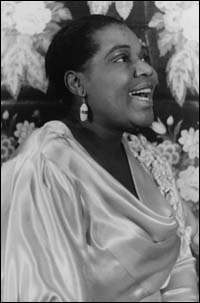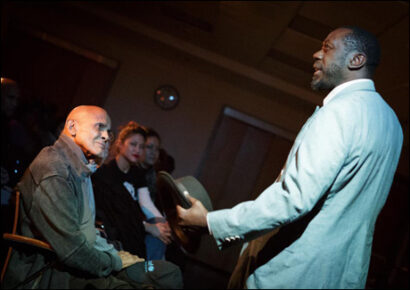
*
The latest foray into what is commonly referred to as "site-specific art" has come in the form of an obscure play exploring the legend of a famous black blues singer's death, after being denied medical treatment during the Jim Crow Era south — being staged at an inner-city hospital on the brink of shuttering.
It doesn't seem like it can get any more specific than that.
Edward Albee's The Death of Bessie Smith was written 75 years ago and isn't recognized as one of the more notable works by the playwright of Who's Afraid of Virginia Woolf?, but a revival of the short piece is taking on new meaning for Brooklyn's Interfaith Medical Center, where it is currently being staged through Feb. 9.
With a cast featuring Jessica Afton, Brian D. Coats, Jamyl Dobson, Edwin Lee Gibson, Keilly McQuail, James Patrick Nelson and Paul Wilcox, the Jonathan Solari-directed production is bringing attention to the possible closure of the Bedford Stuyvesant-based hospital. In recent years, the small community medical center filed for bankruptcy and has been struggling to keep its doors open. The New Brooklyn Theater, founded in 2012, is using its altruistic talent pool as a change agent. "We've been actively pursuing a permanent home for the arts in Bed-Stuy for the past several years," Solari, artistic director of the non-profit theatre company, told Playbill.com. "As an organization, we have become deeply invested in our home and the issues that impact our audience... We have always felt that we had an obligation to use our art form as a way to speak to the social issues that our neighbors deal with on a daily basis and we learned that there was a need for our work."
While revisiting Albee's body of work, Solari said he discovered The Death of Bessie Smith and after reading it through, had the epiphany that the play contained the relevance to speak to the complex issues facing his neighborhood's hospital. Jeff Strabone, the company's chairman, was already active in the fight to save a few of New York City's hospitals (some have already shuttered in recent years) and was arrested with Mayor Bill de Blasio for civil disobedience while protesting a possible closure.
| |
 |
|
| Bessie Smith |
According to Solari, Bessie Smith, an unseen character in the play, became a symbol for "the employees and patients whose lives are hanging in the balance, the invisible men and women who are not considered when these decisions are made."
Urban legend tells the story of how Smith, who was renowned as "The Empress of the Blues" (who also starred in the 1929 Broadway musical Pansy), died tragically after being turned away from a racist Mississippi hospital in 1937. Although it was later revealed she actually expired at a segregated hospital without regaining consciousness from the accident a few hours before, Albee's one-act play tells more of the historical falsehood, even adding more to the context about the lack of medical treatment and the tale of two southern hospitals.
Written in 1959 and premiered West Berlin the following year, The Death of Bessie Smith played Broadway's Billy Rose Theatre in October 1968. In 2003, during a festival of one-act plays written by Albee, it was performed at Chicago's Goodman Theatre. The new production began at Interfaith Jan. 9.
"Initially, we applied for the rights through Dramatists Play Service and were denied," Solari said. "Mr. Albee is famously protective of his work and we had anticipated that a simple online form would not properly explain the severity of the situation. Through connections I had made while assisting Bart Sher at Intiman [Theatre Festival] in Seattle, I was able to contact Pam MacKinnon, who has brilliantly interpreted Mr. Albee's work in the past. She contacted Mr. Albee's office and explained what our intentions were, to raise awareness of the danger that our community's asset was in. Within 24 hours, we were told that the decision had been reversed and that Mr. Albee had sent us his best wishes for the project." There were a few caveats to Albee's change of heart: The production couldn't charge admission, pay any member of the creative team or invite critics.
"I imagine that these restrictions were put on to enforce that the primary focus of our production remain the hospital's well-being," Solari, a 10-year Brooklyn resident, added. "Since our initial two-week run was such a success, we approached Mr. Albee about the possibility of extending. In order to do so, we had to upgrade our contract with Equity and pay our actors. Mr. Albee graciously amended our original contract to allow us the possibility of extension. All performances remain free and open to the public."
After the Feb. 1 evening performance, entertainer and activist Harry Belafonte participated in a talkback session — a panel discussion with leaders in the arts, government, labor and health. The main objective of the discussions, which take place after each show, is to raise questions about health access, race, class and the arts.
"The response to this play has exceeded all of my expectations," Solari added. "Over the month that we have been in the hospital we have seen sit-ins, press conferences, the diversion of ambulances, a change in hospital leadership and an outcry from our local government that has put this specific issue on the desk of President Obama. The narrative has shifted. When we began performances we were hoping to simply draw attention to a problem throughout our city, now we have a real chance to be part of the movement that is going to save this hospital and the patients it serves."
Solari concluded: "We would like to continue performances until there is a permanent solution for the hospital. At this point, we do not have the funds necessary to continue beyond Feb. 9 but are actively seeking support to continue."
Tickets to all performances are free to the public and available by visiting artful.ly/store/events/2261.










